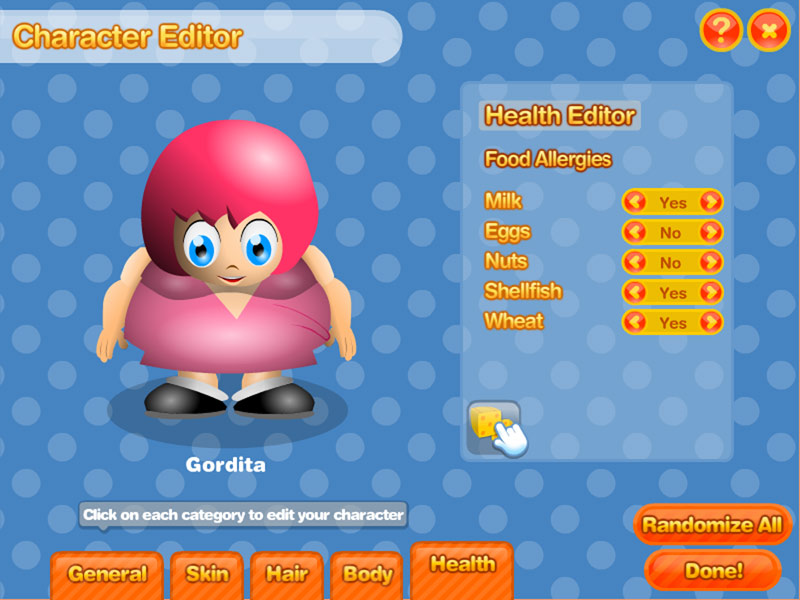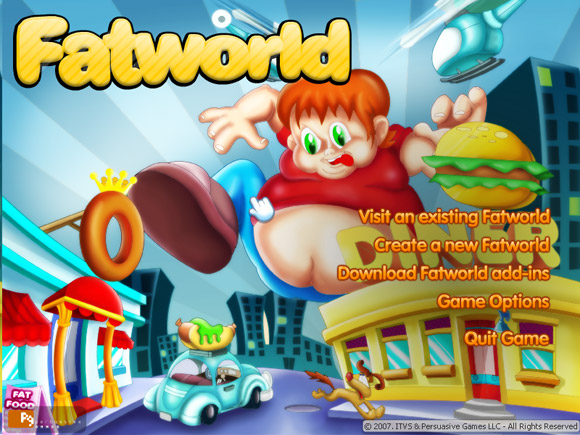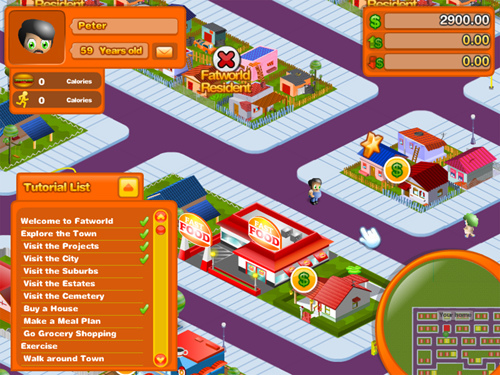Walking (very, very slowly) in Fatworld
By Lesley | March 17, 2011
Fatworld was released by Persuasive Games waaaaay back in 2007, and funded by the US Corporation for Public Broadcasting—better known to you and me as PBS. There was some brief conversation about it in the fat blogosphere at the time, so when I ran across it again recently, entirely by accident, it was not unfamiliar to me. This time, however, I was seized with the idiotic urge to actually download and play it, as I did not recall any of the prior critics doing so. (If I’m wrong on this, please add links in comments.)
The game’s stated purpose is to explore “the politics of nutritionâ€, which is a sound concept. The description argues that Fatworld will “ …demonstrate the complex, interwoven relationships between nutrition and factors like budgets, the physical world, subsidies, and regulations.†Hey, I’m on board so far! These are issues we don’t discuss enough!
Blockquote my heart:
…[Most public health programs] assume that our obesity crisis is caused solely by lack of self-control: if only everyone would choose to eat right and exercise, the problem would go away. But our culture and environment are actually structured to discourage healthy habits. Refined sugars, trans-fats, and preservatives pervade supermarket foods. Packaged foods make our overworked lives more convenient at the hidden cost of poor nutrition. Our hyper-consumerist, debt-driven culture impels us to work more, both pushing us toward high-fat fast food convenient and appealing and structuring our lives so we don’t think we can make any time for exercise.
I’m still with Fatworld, here. I dig its critical perspective and willingness to push back against cultural discourse. And yet:
We worry about airplane security and dirty bombs, but we also stuff ourselves with high-fat, low nutrient foods.
[…]
The game’s goal is not to tell people what to eat or how to exercise…
Okay. Fatworld’s not going to tell you what to eat, but if you eat the wrong things, you’re just like a terrorist. Oh really, no, eat what you want! (Murderer.)
There is some tension here, to say the least. Going in, I expected the game was not overtly trying to shit on actual fat people, but it would probably happen anyway, because it’s just so easy to do when you come at these issues without a hyper-vigilant eye for all of the stereotypes and assumptions that we live with, uncritically, every day. Undaunted, I downloaded Fatworld and fired it up. Character creation includes options for age, gender, economic status and body size: economic statuses include “poor,†“middle class,†and “wealthy,†while body sizes consist of “underweight,†“average†[sic], “overweight,†“obese,†and “extreme†(EXTREEEEEEEEEEEEEEEME FATTERY!). There is no option for race, curiously, aside from being able to change the skin tone of your character; this seems a pretty profound oversight, as fatness interacts with health differently across race. Like, we have statistics on this. But whatever; Fatworld is colorblind. I created a charcter who was 34 years old, female, obese and middle class, with no preexisting health issues, and dubbed her Li’l Fat Lesley.

This is a promotional image of the character creation screen. Yes, the pink-haired fat lady is named "Gordita".
The opening of the game requires you to complete a long checklist of tutorial tasks, which entails walking your avatar all over Fatworld. This would not be a problem if my avatar did not move at the approximate speed of a near-dead slug undergoing premature rigor mortis. The tutorial instructed me that pressing “shift†whilst walking would allow me to move faster, and so I complied—until my character suddenly slowed to a stop, and a talk bubble appeared over her head, reading, “pant, pant.â€
Really? “Pant, pant� Really?
For several minutes after, Li’l Fat Lesley could not walk more than a block without stopping to “pant.†And then, whilst waiting for her to catch her breath, I received a totally random pop-up message informing me that she had “pigged out†at a birthday party, when she had done no such thing, but had rather been panting her way to the grocery store. While I know that Li’l Fat Lesley is hardly intended to be a precise replica of me, this was when I began to feel my anger rising. I live in Boston, kids, and though I am barely average amongst my peers here, anywhere outside of Boston or New York I am an extremely fast walker. I tried to take my frustration with Li’l Fat Lesley’s abysmal pace as an opportunity to check my own ableism, but that did little to assuage my frustration as getting anywhere in-game was taking for-freakin’-ever. I realized that while I have no problem with moving slowly to accomodate an actual human person, my patience was markedly less for an in-game avatar using slowness to make a point about the inherent and universal ability of fat bodies. (With a few tweaks Fatworld could be usefully modded as an ableism-checking game, now that I think about it.)
Once you purchase your in-game house—or rather your kitchen, as that is the only room—you can plan your meals. The game has actual recipes in it, which I thought was a neat idea until I discovered that half of them are labeled as “Atkins,†“Low Carb,†or “South Beachâ€. So much for avoiding unrealistic short-term fad diets in this fun game about health, kids! The gameplay for both meal-planning and then grocery-shopping was about as fun as a sharp stick to the eye, so I decided to sluggishly waddle Li’l Fat Lesley over to the running track for some exercise.
You run, in Fatworld, by alternating rapid presses of the G and H keys. Once you get that down, holding the shift key at the same time makes you go “faster†still. I use faster ironically, because Li’l Fat Lesley ran even more slowly than she walked. Much more slowly. Slowly enough that I was struck dumb by the hilarity of Fatworld’s apparent mission to make your real-world body sit nearly motionless at the computer for absurd amounts of time making a fat avatar “run†in a straight line. I spent four minutes pounding G and H and holding down shift before Li’l Fat Lesley reached the end of the track, at which point the game announced, yay, you burned 14,448 calories!
…
…….
I don’t blog with emoticons, generally speaking, but the face I made was a precise replica of that emoticon with the small o and the underscore and the big O. About.com has a handy dandy calculator to estimate the number of calories you burn in a day. Go fill that out. (Be warned: site is very diet-y.) According to that calculator, I burn roughly 2900 calories in an average day. According to Fatworld, “running†one lap on the Fatworld running track for four minutes burned five times my daily average. I’m pretty sure that if a real-world person pushed themselves so hard, they’d pass out before crossing the finish line. According to this other calculator, even if I took an hour-long real-life run at 10 miles per hour—a much higher pace than I could keep, being not a frequent runner— that would only burn 2376 calories. I get that Fatworld runs on an accelerated schedule (one day Earth time is equal to one year Fatworld time) but this hardly seems useful or accurate for a game that purports to teach young people about nutrition and fitness in general.
Says the description:
By choosing your character’s dietary and exercise habits, you can experiment with the constraints of nutrition and economics as they affect your character’s general health. Will it be wheatgrass and soy? Or fried chicken at every meal? How much can you afford to spend on food, and how does that affect your general health? Characters who eat poorly will get fat. Characters who don’t exercise will move around the world more laboriously. Disease and death will eventually ravage players with poor health, while those with good health will live to a ripe age.
Except not all real-life fat people eat fried chicken at every meal. Nor are all fat people poor, nor are they uneducated (nor are all poor people uneducated, etc etc ad nauseam). Nor do they all move “laboriouslyâ€. Reproducing these stereotypes in-game underscores these assumptions in real life, and that serves no useful purpose at all–reinforcing these ideas helps no one, of any size, to be healthier, and actually does more harm than good.
Following my torturous keyboard-ripping run, I brought Li’l Fat Lesley over to the Health-O-Mat for an assessment, and in Fatworld’s defense, it identified her as having “superb†general health while also noting her “obesityâ€. It also said that Li’l Fat Lesley had a BMI of 32.8, and at this I ROFed while LOLing my AO, as my actual BMI is around 45.6, which likely put me in Fatworld’s “extreeeeeme†category. I briefly considered trying an “extreme†avatar instead, but after my obese experience I was fairly convinced that an “exteme†avatar would not walk at all, but would rather sit motionless and develop her own gravitational field, by which she could capture the grocery store and the running track and bring them to her, rather than tromping all over town at a snail’s pace. So I quit.
The sad thing about Fatworld is that it clearly had good intentions. I had hoped that given its politicized intent, it might be more critical of the rhetoric around obesity, or if it wasn’t, that it would demonstrate the changes of the intervening years since its release. Unfortunately, it accomplishes neither, and instead of trying to say something new about public health and nutrition, Fatworld uses fat bodies as lazy shorthand for poor health and “bad†choices. For a game that is supposed to be about interrogating the institutional and cultural systems that we take for granted, it is remarkably short-sighted in its presumptuous assertions about what fat bodies mean in its game world, and in so doing it reinforces the same negative stereotypes about fat people that are prevalent in cultural discourse. It suggests that simply looking at a person’s body tells us candid truths about that person’s habits. Thin people cannot have diabetes! Fat people cannot eat vegetables! Perhaps most troubling is the game’s subtext, that the subjective health of even strangers is not and should not be a private matter, but rather a public one, open to comment and debate. This game is several years old now, and yet so little has changed; we are still focused on being against fattery instead of being for health.





 Two Whole Cakes is a blog written by
Two Whole Cakes is a blog written by 


21 Comments